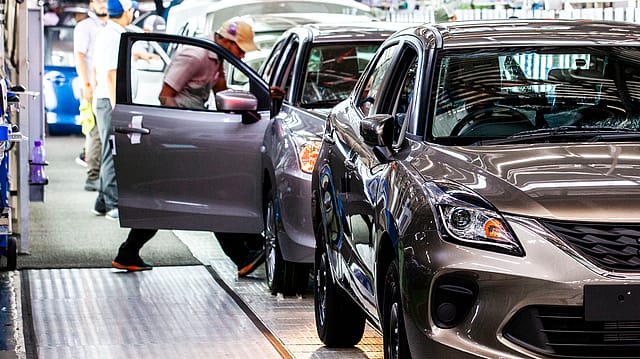Maruti Suzuki, Hyundai, M&M shares hit record high on hopes of GST rate cut
ADVERTISEMENT

Shares of Maruti Suzuki India Ltd and Mahindra & Mahindra Ltd (M&M) hit a record high in intraday trade on Monday after the government proposed two Goods and Services Tax (GST) rates of 5% and 18% last week.
If the GST Council adopts the proposed tax structure, then prices of automobiles would likely fall as GST on cars and two-wheelers would come down from 28% to 18%, making them affordable to a large section of consumers.
“In case tax is lowered for the auto sector by 10%, it could boost demand, in our view, by around 15-20%,” Nomura analyst Kapil Singh said in a report.
A common rate of tax for small cars and SUVs may also hand a significant advantage to SUVs, he added. SUVs currently attract 17-22% compensation cess in addition to 28% GST.
Reacting to possible tax cuts, shares of India’s biggest carmaker, Maruti Suzuki, rose 9% to hit an all-time high of ₹14,120 on the BSE, taking the Japanese company’s market cap to ₹4.42 lakh crore.
Hyundai Motor India Ltd , the country’s second-largest carmaker, saw its stock price jump as much as 10% to hit a record high of ₹2,460 on the BSE.
Shares of two-wheeler maker TVS Motor Company rose as much as 7% to hit a 52-week high of ₹3,225 on the BSE. The stock price of Hero MotocCorp and Bajaj Auto rose 9% and 5%, respectively.
Shares of tractors and SUVs giant M&M rose 5% to hit a record high of ₹3,415.45 on the BSE, taking the company’s m-cap to ₹4.26 lakh crore.
The GST rate rationalisation can positively impact sectors such as tractors, which are currently taxed at 12% and could move to the 5% bracket, Nomura said.
“While companies are likely to pass on most of the tax reduction to the end consumer, it nevertheless improves their pricing power and operating leverage. Such a scenario could be positive for companies such as Mahindra & Mahindra,” the brokerage added.
EVs, which currently attract 5% GST rate, may see a meaningful impact on demand as the price gap with ICE will likely increase sharply, cautioned Nomura.
If the GST cut on ICE happens, it is likely to significantly impact the EV adoption which is a key focus area for the government as the price gap between EVs (taxed at 5%) and ICE (taxed at 28%+cess) would increase sharply, Nomura stated. “This would be counterproductive for all the EV adoption schemes like PLI which hand out 13-18% revenue incentive to EVs to bridge the price gap between EVs and ICE.”
Any possible tax cuts on automobiles may also accelerate car penetration in India which has been rising very slowly and currently estimated at around 32 per 1,000 people, highlighted Nomura.
“A tax cut across the board to the 18% bracket would boost demand. If there is a common rate for small cars and SUVs, then SUVs are likely to gain further share,” the brokerage said.
Nomura noted that the revenue loss from this could be over $9 billion just for the OEM sales. “If the cess is also removed, there will be a further impact of $7 billion. Revenue lost on aftermarket sales (batteries, tyres, engine oil etc) would be additional. It would require a 50%+ OEM volume jump to cover up this loss. We estimate the volume boost could be 15-20%. It remains to be seen if the government would take to such a large loss of revenues as tax collections recently have been slow,” it said.